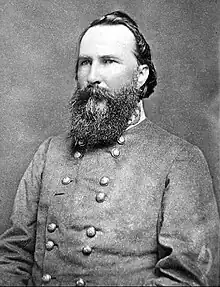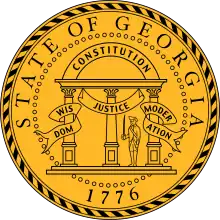The Georgia (U.S. state) PortalGeorgia /ˈdʒɔːrdʒə/ ⓘ is a state located in the southeastern United States. It was established in 1732, the last of the original Thirteen Colonies. Named after King George II of Great Britain, Georgia was the fourth state to ratify the United States Constitution, on January 2, 1788. It declared its secession from the Union on January 21, 1861, and was one of the original seven Confederate states. It was the last state to be restored to the Union, on July 15, 1870. Georgia is the 24th most extensive and the 8th most populous of the 50 United States. From 2007 to 2008, 14 of Georgia's counties ranked among the nation's 100 fastest-growing, second only to Texas. Georgia is known as the Peach State and the Empire State of the South. Atlanta is the state's capital and its most populous city. Georgia is bordered on the south by Florida; on the east by the Atlantic Ocean and South Carolina; on the west by Alabama; and on the north by Tennessee and North Carolina. The northern part of the state is in the Blue Ridge Mountains, a mountain range in the vast Appalachian Mountains system. The central piedmont extends from the foothills to the fall line, where the rivers cascade down in elevation to the continental coastal plain of the southern part of the state. The highest point in Georgia is Brasstown Bald, 4,784 feet (1,458 m); the lowest point is the Atlantic Ocean. Georgia is the most extensive state east of the Mississippi River in terms of land area, although it is the fourth most extensive (after Michigan, Florida, and Wisconsin) in total area, a term which includes expanses of water which are part of state territory.
Selected article - The Battle of Atlanta was a battle of the Atlanta Campaign fought during the American Civil War on July 22, 1864, just southeast of Atlanta. Continuing their summer campaign to seize the important rail and supply center of Atlanta, Union forces commanded by William T. Sherman overwhelmed and defeated Confederate forces defending the city under John B. Hood. Union Maj. Gen. James B. McPherson was killed during the battle. Despite the implication of finality in its name, the battle occurred midway through the campaign and the city did not fall until September 2, 1864, after a Union siege and various attempts to seize railroads and supply lines leading to Atlanta. After taking the city, Sherman's troops headed south-southeastward toward Milledgeville, the State capital, and on to Savannah with the March to the Sea. The fall of Atlanta was especially noteworthy for its political ramifications. In the 1864 election, former Union General George B. McClellan, a Democrat, ran against President Lincoln on a peace platform calling for truce with the Confederacy. The capture of Atlanta and Hood's burning of military facilities as he evacuated were extensively covered by Northern newspapers, significantly boosting Northern morale, and Lincoln was reelected by a large margin. Selected picture - Georgia Dome in 2011 Credit: Ken Lund
The Georgia Dome was a domed stadium in the southeastern United States, currently under demolition. Located in Atlanta, Georgia, between downtown to the east and Vine City to the west, it was owned and operated by the State of Georgia as part of the Georgia World Congress Center Authority. Its successor, Mercedes-Benz Stadium, was built adjacent to the south and opened in August 2017. State facts
State symbols:
Selected biography -
James Longstreet (January 8, 1821 – January 2, 1904) was one of the foremost Confederate generals of the American Civil War and the principal subordinate to General Robert E. Lee, who called him his "Old War Horse." He served under Lee as a corps commander for many of the famous battles fought by the Army of Northern Virginia in the Eastern Theater, but also with Gen. Braxton Bragg in the Army of Tennessee in the Western Theater. Biographer and historian Jeffry D. Wert wrote that "Longstreet ... was the finest corps commander in the Army of Northern Virginia; in fact, he was arguably the best corps commander in the conflict on either side." Longstreet's talents as a general made significant contributions to the Confederate victories at Second Bull Run, Fredericksburg, and Chickamauga, in both offensive and defensive roles. He also performed strongly during the Seven Days Battles, the Battle of Antietam, and until he was seriously wounded, at the Battle of the Wilderness. His performance in semiautonomous command during the Knoxville Campaign resulted in a Confederate defeat. His most controversial service was at the Battle of Gettysburg, where he disagreed with General Lee on the tactics to be employed and reluctantly supervised the disastrous infantry assault known as Pickett's Charge. He enjoyed a successful post-war career working for the U.S. Government as a diplomat, civil servant, and administrator. However, his conversion to the Republican Party and his cooperation with his old friend, President Ulysses S. Grant, as well as critical comments he wrote in his memoirs about General Lee's wartime performance, made him anathema to many of his former Confederate colleagues. Authors of the Lost Cause movement focused on Longstreet's actions at Gettysburg as a primary reason for the Confederacy's loss of the war. His reputation in the South was damaged for over a century and has only recently begun a slow reassessment. Selected anniversaries for December
Did you know -
Categories
Select [►] to view subcategories
Georgia (U.S. state) Georgia (U.S. state)-related lists Communications in Georgia (U.S. state) Georgia (U.S. state) culture Demographics of Georgia (U.S. state) Economy of Georgia (U.S. state) Education in Georgia (U.S. state) Environment of Georgia (U.S. state) Geography of Georgia (U.S. state) Government of Georgia (U.S. state) Health in Georgia (U.S. state) History of Georgia (U.S. state) Georgia (U.S. state) law Native American tribes in Georgia (U.S. state) Paintings in Georgia (U.S. state) People from Georgia (U.S. state) Politics of Georgia (U.S. state) Professional wrestling in Georgia (U.S. state) Science and technology in Georgia (U.S. state) Georgia (U.S. state) society Sports in Georgia (U.S. state) Tourist attractions in Georgia (U.S. state) Works about Georgia (U.S. state) Images of Georgia (U.S. state) Georgia (U.S. state) stubs WikiProjects
WikiProjects
What are WikiProjects? Selected panoramaCredit: Ebyabe
Fort James Jackson (usually shortened to Fort Jackson) is a restored nineteenth-century fort located one mile east of Savannah, Georgia, on the Savannah River. It hosts the Fort Jackson Maritime Museum. Fort Jackson was constructed between 1808 and 1812 to protect the city of Savannah from attack by sea. During the American Civil War, it became one of three Confederate forts that defended Savannah from Union forces (the other two were Fort McAllister and Fort Pulaski). In 1862, Fort Jackson came under shelling from a ship captained by an escaped slave, Robert Smalls. Selected quoteQuality content
Featured articles
Featured lists
A-Class articlesFeatured pictures
TopicsThings you can doedit · history · watch · purge
Related portalsAssociated WikimediaThe following Wikimedia Foundation sister projects provide more on this subject:
Discover Wikipedia using portals
|

.svg.png.webp)


